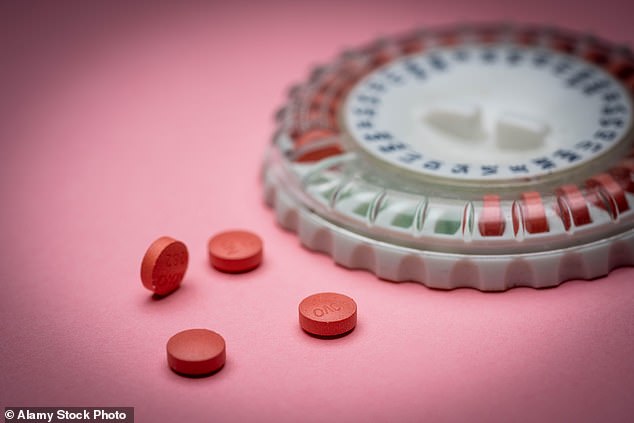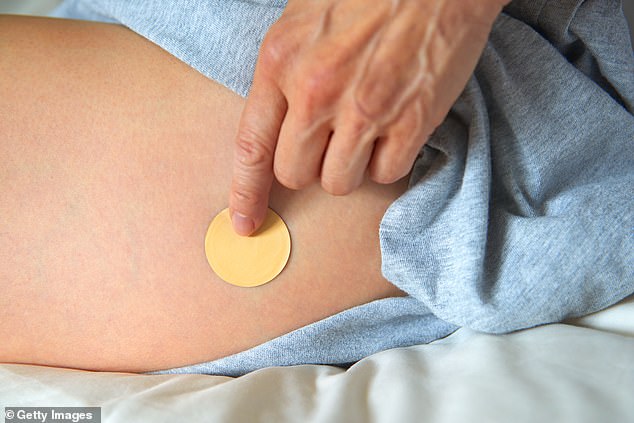It’s hard to overstate the revolution that has occurred in menopause treatment over the past decade.
In the UK, it is thought that about 13 million women are, at any one time, experiencing the distinctive midlife issues – including low mood, anxiety, hot flushes and difficulty sleeping.
Back in 2018, fewer than 1.3 million NHS patients were being prescribed hormone replacement therapy (HRT), a safe and cheap medicine proven to effectively combat the most debilitating menopause symptoms. Today this figure has doubled, with about 2.6 million women now on the medication, which replenishes the female sex hormones oestrogen and progesterone that are lost during the menopause.
This astonishing increase is thanks, in large part, to a group of determined campaigners who have pushed both the Government and the NHS to ensure more women are offered HRT.
This is, unquestionably, good news. However, I have become increasingly concerned that something has been missing from the national conversation about HRT: advice on how and when women should stop taking it.
HRT is not a medicine that is meant to be taken for life. Instead, it is supposed to help women get through the difficult period when menopause symptoms occur.
And once the menopause has passed, women can, if they wish, stop taking it without any reduction in the quality of their life.
But this isn’t a message shared by many campaigners, who treat HRT more like a wonder drug that supposedly provides women with boundless energy and everlasting youth.

Professor Annice Mukherjee recommends lifestyle changes to alleviate symptoms of HRT

2.6 million women in the UK are now on HRT, which replenishes the female sex hormones oestrogen and progesterone that are lost during the menopause
Some campaigners even claim that staying on it indefinitely will extend life.
But for most women, this is unnecessary. And, for some, coming off the medicine can even improve their lives.
Last week, Mail columnist Sarah Vine movingly described how she had decided to come off HRT after more than five years.
She said that HRT was a ‘total salvation’ which helped combat the mood swings, brain fog, weight gain, disturbed sleep, zero sex drive, hot flushes and exhaustion she began to experience at 47.
For this reason, Sarah had long believed that HRT was something that ‘women should stay on for ever’.
However, due to a shortage of popular forms of the drugs during the Covid pandemic, she began to take the medicine every other day.
And when she did not experience any change in her symptoms, she eventually stopped altogether.
To her surprise, Sarah says she didn’t feel any worse.
In fact, she said: ‘I’ve never felt happier or more confident than I do today, in my barren, hormone-free state.’
In the days after Sarah’s article, she heard from scores of women who wanted to share their own positive experience of coming off HRT.

HRT is not a medicine that is meant to be taken for life. Instead, it is supposed to help women get through the difficult period when menopause symptoms occur, writes Dr Ellie Cannon

Health experts say lifestyle changes, such as eating better, exercising regularly and getting more sleep can be beneficial for menopausal women
It’s not the first time I have heard this point of view. Far from it. Many of my female patients who have a positive experience on HRT are also just as happy when they come off it.
It’s hardly surprising, as HRT is not without side effects.
Many women only realise when they stop taking them that the nagging symptoms they experience are, in fact, triggered by the drugs, not the menopause.
Moreover, almost all patients would prefer not to be taking drugs every day if they had a choice – not least because of the time and effort of procuring and administering them.
The problem is that there is so little information out there advising patients on when is the right time for them to stop taking HRT – and how to do this correctly. So with the help of a team of some of the UK’s top menopause experts, I explain all you need to know…
I’ve been on HRT for years with no problems – do I need to keep taking it?
Women who have been on HRT for more than five years and have no menopause symptoms should consider coming off it.
Menopause usually affects women between the ages of 45 and 55, but it can happen earlier. Not all women will need treatment. Around a quarter of women in the UK will have few to no symptoms, while others may have issues that are not disruptive enough to warrant HRT.
For those who do experience symptoms, research shows these can last anywhere between two and seven years. Some symptoms also tend to last longer than others. Women often report experiencing hot flushes a decade after they enter the menopause.
During this time, many women find that HRT – which is taken via skin patches, gels or pills – is a godsend. But experts say that once symptoms stop, it’s important patients consider whether they still need the medicine.
The main reason for this is that HRT may raise the risk of serious illnesses. Research shows that women on HRT have a slightly raised risk of breast cancer, while HRT tablets – which are less commonly used in the UK – are thought to raise the risk of blood clots and strokes.
And some studies have linked long-term HRT use to an increased chance of dementia – though this is still hotly debated.
‘While HRT only appears to marginally raise the chances of breast cancer and dementia, the risk is not zero,’ says Dr Paula Briggs, a sexual and reproductive health expert and former chairwoman of the British Menopause Society.
‘That’s why it’s important that patients who have been taking HRT for a long time and don’t have any symptoms ask themselves, “Do I really need to keep taking this?”‘
I want to keep taking HRT – will my doctor eventually force me to come off it?
Unless patients have a life-threatening health problem, doctors cannot force them to stop taking HRT.
Once a woman is prescribed the medicine, it’s her choice how long she stays on it. I do sometimes hear from women who say their GP has been quite forceful about stopping treatment. That isn’t right, and it can make patients anxious about losing access to something that’s helped them.
However, doctors are expected to carry out an annual check-up to ensure HRT is needed. If a patient is still struggling with symptoms, they may suggest increasing the dose. If not, they may recommend lowering it.
‘There are no strict rules on when or by how much to reduce the dose,’ says Dr Briggs. ‘But a common approach is to halve it at 60 and come off it completely by 65.
‘That said, women who feel better staying on their current dose don’t have to change anything.’
The only time that someone would be taken off HRT against their wishes is if they are diagnosed with breast cancer – as the hormones can fuel tumour growth and increase the risk of the disease coming back.
I take HRT but still have symptoms – is it to blame?
The side effects of HRT tend to be distinctive – meaning they’re usually not mistaken for menopause symptoms. These include breast tenderness, headaches, unexplained vaginal bleeding or spotting, muscle cramps and nausea.
In many cases these settle after a few weeks. But for some women they can persist for years – or as long as they remain on HRT.
In my experience, these side effects are some of the main reasons women eventually come off HRT or reduce their dose. However, experts also warn that persistent symptoms may have nothing to do with HRT or the menopause.
‘I hear from women wondering if problems like poor sleep or joint pain could be fixed by changing their HRT dose,’ says consultant endocrinologist Professor Annice Mukherjee.
‘I explain that, often, these are caused by other health issues such as stress or obesity. The menopause isn’t the root of every mid-life symptom – and HRT isn’t always the cure.’
I’ve heard that you can get withdrawal symptoms when you stop taking HRT – can this be avoided?
All patients who stop HRT should expect some withdrawal symptoms.
These are triggered by the drop in oestrogen, and can include hot flushes, night sweats, disturbed sleep, mood changes and vaginal dryness or itching.
For most, these issues settle within three months. If they persist beyond that, it may suggest the patient is still going through the menopause.
The severity of withdrawal symptoms often depends on how the treatment is stopped. Studies show that tapering the dose gradually – over months or even years – makes side effects less likely.
Patients who stop suddenly, which usually only happens after a breast cancer diagnosis, are at higher risk of severe symptoms.
However, research shows that whether you stop gradually or all at once doesn’t affect the chances of longer-term menopause symptoms coming back.
There are different ways to taper HRT. Some women take it on alternate days, slowly increasing the gap between doses. Others using patches might cut them into smaller pieces.
I’m worried that my menopause symptoms might come back – what should I do if that happens?
If menopause symptoms return, there’s no reason women can’t go back on HRT.
Women reach the end of menopause at different times, so it’s not unusual to come off the treatment too soon – it’s often a process of trial and error. In these cases, they would usually restart with the last dose they were on. If that doesn’t help, the dose can be increased until symptoms ease.
That said, not everyone chooses to restart HRT. Some may want to avoid side effects, or feel that their symptoms don’t warrant medication. And women who’ve had breast cancer cannot return to HRT, no matter how severe their symptoms.
For them, other treatments are available. Vaginal dryness or itching can be treated with oestrogen gel, used as needed rather than daily.
Those struggling with sleep may benefit from melatonin – a prescription sleep aid.
There are also promising new non-hormonal drugs for hot flushes and night sweats. One, fezolinetant, is already available privately in the UK and is expected to be approved for NHS use within a year.
But experts say lifestyle changes are among the most effective ways to reduce the risk of symptoms returning.
‘If you’re on HRT but not exercising, eating poorly and regularly drinking alcohol, you’re likely to struggle when you try to stop,’ says Prof Mukherjee. ‘Improve these habits now and you’ll have fewer symptoms later on.’
To pre-order Dr Ellie Cannon’s The Little Book Of HRT: Your Essential Guide To Hormones And Menopause, published on September 11, go to: tinyurl.com/littlebookofhrt.
Quitting the drug was so liberating – and many of you agree with me

Last week, Mail columnist Sarah Vine movingly described how she had decided to come off HRT after more than five years
After I wrote last week about quitting HRT, and the subsequent sense of liberation I felt having gone through the menopause and come out the other side, scores of women got in touch to share similar experiences.
It was remarkable how many of them chimed with mine.
I began to taper off during Covid, as there was a general shortage of HRT and I didn’t want to run out. I decided to eke out my stock by taking it on alternate days – and to my surprise I felt no difference at all.
The symptoms that had plagued me – hot flushes, mood swings, brain fog, all the usual suspects – didn’t return, and so eventually I just stopped.
It was an instinctive decision, really – I didn’t consult my doctor – I just listened to my body and did what seemed to make sense.
It’s fascinating, therefore, to realise that I’m not alone, and numerous medics, some of them on these pages, approve of my choice.
All the conversation around the menopause focuses on the benefits of HRT, and pretty much every high-profile female celebrity over the age of 50 extols the virtues of taking it.
Having been somewhat controversial, HRT is almost marketed now as some kind of magic pill, the key to eternal youth.
There is a growing sense that for a woman NOT to be on it is at best eccentric, at worst irresponsible.
After all, here is a drug that stops us from turning into irascible, grumpy old crones: why wouldn’t you take it?
On one level, I agree. It is an invaluable tool for softening the symptoms of menopause.
But the menopause itself is nothing to be ashamed of, and it is a biological inevitability.
The idea that it can somehow be avoided indefinitely is, I think, not entirely healthy – especially in a world where expectations around women and ageing are so unrealistic.












